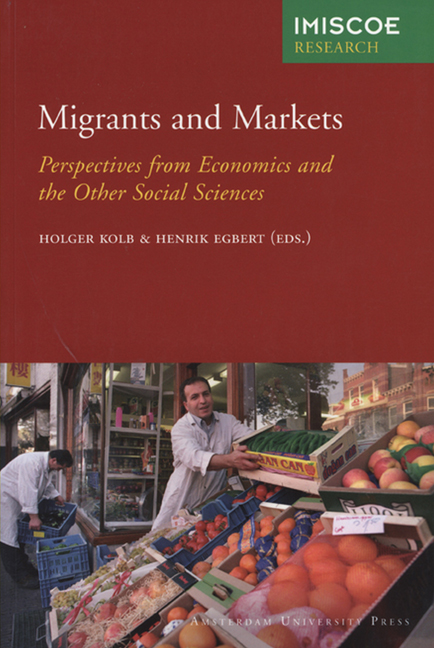Book contents
- Frontmatter
- Contents
- Introduction: Migrants and Markets: Perspectives from Economics and the Other Social Sciences
- The Impact of Immigration on the Labour Market: A Survey
- Investigating the Economic Impact of Immigration on the Host Country: The Case of Norway
- The Exit Option of Labour Migration from East to West Germany: Individual and Contextual Determinants of Unemployed Workers’ Geographic Mobility
- How Recent Amendments in German Immigration Law Affect Decisions: The Case of Polish Doctors
- Educational Selectivity and Labour Market Attainment of Jewish Immigrants from the Former Soviet Union in Israel and Germany in the 1990s
- States as Clubs? The Political Economy of State Membership
- Chinese Student Migration in Europe: A Migration That Nobody Objects To?
- Assessing Interdependencies between Sector Structures and Labour Migration: A Comparative Study of the British and the German Health Sectors
- Workers’ Remittances and International Risk Sharing
- Skills and Remittances: The Case of Afghan, Egyptian and Serbian Immigrants in Germany
- The Impact of Migration on Foreign Trade in Bolivia
- List of Contributors
- Other IMISCOE Titles
Workers’ Remittances and International Risk Sharing
Published online by Cambridge University Press: 02 February 2021
- Frontmatter
- Contents
- Introduction: Migrants and Markets: Perspectives from Economics and the Other Social Sciences
- The Impact of Immigration on the Labour Market: A Survey
- Investigating the Economic Impact of Immigration on the Host Country: The Case of Norway
- The Exit Option of Labour Migration from East to West Germany: Individual and Contextual Determinants of Unemployed Workers’ Geographic Mobility
- How Recent Amendments in German Immigration Law Affect Decisions: The Case of Polish Doctors
- Educational Selectivity and Labour Market Attainment of Jewish Immigrants from the Former Soviet Union in Israel and Germany in the 1990s
- States as Clubs? The Political Economy of State Membership
- Chinese Student Migration in Europe: A Migration That Nobody Objects To?
- Assessing Interdependencies between Sector Structures and Labour Migration: A Comparative Study of the British and the German Health Sectors
- Workers’ Remittances and International Risk Sharing
- Skills and Remittances: The Case of Afghan, Egyptian and Serbian Immigrants in Germany
- The Impact of Migration on Foreign Trade in Bolivia
- List of Contributors
- Other IMISCOE Titles
Summary
Introduction
The process of international financial integration, which accelerated in the past two decades, can potentially bring numerous benefits to the world economy. One of the central benefits it offers to the residents of different countries is the possibility to diversify their macroeconomic risks internationally. Therefore, through the process of cross-border trade in assets, these countries can relax the link between domestic output growth and domestic consumption (income) growth up to the point when the latter will depend exclusively on the world output growth. This process, through which country-specific risks are diversified away across national borders, is known as international risk sharing. Moreover, the finance literature usually associates it with the underlying trade in financial assets. Therefore, investment in an internationally diversified portfolio is identified as the major channel through which the process of international risk sharing takes place. Similarly, the deviation from the hypothesis of perfect or complete risk sharing is associated with the tendency by investors to over-invest in domestic assets and thereby forego many diversification opportunities available through investment in foreign assets. This latter phenomenon is also known in the finance literature as home equity (or bond) bias. Since the bias in investment strategies seems to be the most obvious reason for the deviation from complete risk sharing, many empirical studies investigate the relationship between the two.
Though the association between the two phenomena is very clear for the group of advanced economies, it might not be as important for the developing world. Therefore, this paper concentrates on an alternative channel through which one country can smooth consumption and diversify its idiosyncratic risks internationally. In particular, the focus in this empirical study is on workers’ remittance flows to developing countries. The main objective is to find out what role workers’ remittances play in international risk sharing. Do countries that receive above average levels of remittance inflows achieve a significantly higher level of international risk sharing?
The rest of this paper is organised as follows. Section two presents a brief literature review on some important studies on international risk sharing and workers’ remittances, respectively. It is followed by section three that deals with data issues, and section four that puts forward the empirical strategy.
- Type
- Chapter
- Information
- Migrants and MarketsPerspectives from Economics and the Other Social Sciences, pp. 189 - 202Publisher: Amsterdam University PressPrint publication year: 2008



